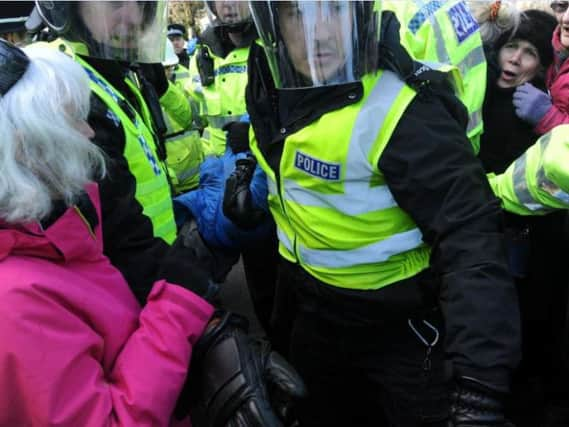Force 'doesn't know' costs of policing Sheffield tree-felling protests


A Freedom of Information response by the force to The Yorkshire Post said it “had not captured the costs of policing tree-felling protests” prior to a recent marked escalation in the number of officers attending work where protests have been taking place in the past three weeks.
It said overtime costs since the new policy came into force, involving in some instances more than 30 officers being deployed, are yet to be processed.
Advertisement
Hide AdAdvertisement
Hide AdIt comes days after it was confirmed the policing element of council tax in South Yorkshire will increase by 7.6 per cent from next month.
In the last few weeks, police have been deploying dozens of officers to streets where tree-felling work is due to be carried out by contractors working on behalf of Sheffield City Council and private company Amey as part of a £2.2bn highways maintenance contract that started in 2012.
The increase in policing numbers follows the work being put on hold for several weeks after clashes between protesters and private security guards hired by Amey that resulted in allegations of assault being made against both sides.
Since the new policy has been brought in, there have been several arrests in angry scenes involving an increased number of protesters, with the force’s rarely-used Protest Removal Team deployed on one occasion wearing riot helmets to remove a protester crouching under a cherry-picker truck.
Advertisement
Hide AdAdvertisement
Hide AdAs part of the council’s PFI contract, work has been taking place to remove thousands of street trees in the city and replace them with saplings.
The council says only dead, diseased, dying and damaging trees are selected for felling but campaigners have argued that many healthy trees are being removed on cost and contractual grounds rather than for environmental reasons.
A FoI response to The Yorkshire Post said that the costs of policing tree-felling protests in the city had not been recorded for previous years, despite 14 people being arrested in different incidents in 2016 and 2017 before cases were dropped against them. In March last year, crime commissioner Alan Billings said there should be no further arrests of protesters on the grounds that the CPS would not bring prosecutions.
However, there have been 11 further arrests since last November following a High Court injunction being granted to Sheffield Council in August that makes it a criminal offence for protesters to stand directly underneath threatened trees as a way of stopping felling.
Advertisement
Hide AdAdvertisement
Hide AdThe response added that there are no recorded overtime costs but “for more recent dates the overtime is unlikely to have been processed yet”.
It comes after Liberal Democrat peer Lord Scriven, a former leader of Sheffield Council, claimed the force’s chief constable Stephen Watson had provided answers that were “evasive and lacking in detail” in explaining the numbers of officers now being sent to the protests.
Lord Scriven said Mr Watson’s recent response to concerns he had raised last week had “raised more questions than they provide answers”.
He said he had been concerned to hear Mr Watson’s explanation that Sheffield Council staff are “co-located” within South Yorkshire Police premises when tree-felling operations are going on.
Advertisement
Hide AdAdvertisement
Hide AdMr Watson said earlier this week that the force had been acting in an “entirely impartial” manner. He said sharing premises with Sheffield Council staff was being done “to allow for effective communication and coordination”.
Lord Scriven added that he felt Mr Watson had been “vague” in his explanation for how it is decided how many officers are sent to protests each day, after the chief constable described how senior police commanders had been following a national decision-making model when making such assessments.
The force has now invited Lord Scriven to a meeting at its headquarters in Sheffield to discuss the issues he has raised.